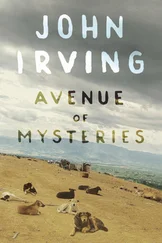The irony of it all was that there in his cell, deprived of news, of weather forecasts, of himself , he saw himself as a clairvoyant. The myriad air bubbles in the cinder blocks of his cell enveloped him like a cosmic mist. When he lay on his plastic slab and breathed deeply, the space constricted and the stars jabbed his skin like needles. The universe was his lung, he commanded space and time, he fathomed everything, in every dimension and on every scale. He knew, down to the picosecond, exactly when and at which latitude and longitude his parents had conceived him, and he also understood the precise causality of that evil deed, the billion-plus-year chain of events that were inextricably riveted to the Big Bang. He knew everything .
And yet, nothing. Even after he was released from his cube of insanity, they left him in the dark. Why?
The late-afternoon sun fell across the American pine flooring that spanned his workroom like an unswept ice rink. The window above his desk was open; a puff of breeze lifted an envelope from the tax office. It was sunny but brisk. He tried to read a book, lay on the floor listening to a Monk record but dozed off. When he woke up, broken and dopey, he went to his computer and checked his e-mail for the umpteenth time. A pair of snow-white doves fluttered through his room: she had written back . Her name in bold black letters on the monitor — it was an electrifying sensation. His fingers trembling, he opened the message.
Yes, Aaron, it sure has been a while. I hope you don’t remember me as someone who’s easily shocked. But I have to admit I was pretty surprised by your first e-mail. You can imagine that sometimes I still worry about your health. Hopefully it was a temporary setback?
You’ll also appreciate that it’s hard for me to be sure whether or not you really did bump into my mother. All I can say is, I haven’t had any contact with her in years. And no, I don’t live in Brussels; I’ve been in Los Angeles for about five years now. I work for a company that makes Frisbees and surfboards. And I’m not married either (although I did live in San Francisco with Boudewijn Stol for a while, maybe you still remember him).
Yeah, if you look at it like that, the fireworks accident did set all kinds of things in motion. For you, for me, and for my father. But Aaron, because I know how sensitive you are: don’t forget that to commit suicide — the term says it all — is a conscious choice. Don’t ask me why, but Siem wanted it that way.
I hardly ever think about it. Preferably never.
Take care,
Joni
He smoked two cigarettes. Stiff from all that sitting, he walked to the middle of the living room, looked up at the rosettes and ornamental borders on the ceiling — not a single dove to be seen. Suicide? The overwhelming joy he had felt had completely evaporated. He reached into the top drawer of the dresser, pulled out a box of oxazepam, and took it to the bathroom. He popped three pills in his mouth and swallowed them with half a glass of chalky water. Whaddya know .
Evening fell. Behind the drawn curtains he worked feverishly on fresh reconstructions, brief variations on the idea that he didn’t miss just Sigerius’s death, but a major tragedy. A disaster. A conspiratorial “they”—individuals, organizations, parties, syndicates, secret services? — had pulled the wool over his eyes, lied to him, deceived him. The bastards had held back pertinent information. Siem Sigerius, at that time the brand-new Minister of Education, his ex-girlfriend’s goddamn father, commits suicide, and nobody tells him? He wondered all sorts of things, too much, too quickly, too deeply. Was the Twentse Tulip in on it? Who had gagged the few visitors he had? Was it even legal, ethical? Secret meetings where psychiatrists connived to keep the truth from patient Bever? Weren’t they being paid to help him come to terms with it? He could just hear them, the white coats, colluding: mum’s the word around mad old Aaron, keep newspapers out of sight, no TV for the cue ball.
For a few hours he sat motionless in one of the red-leather armchairs in his living room and succumbed, eyes closed, to the new reality into which Joni’s e-mail had plunged him, trying with all his might to fend off all-too-inflamed reasoning, anything to keep him from being swallowed up again by the Psychotic Ocean. As the hours passed, he calmed down slightly, the self-centered conspiracy theories stabilized, the whirlpool of thoughts widened and slowed. Just try to be realistic for once, he told himself. An entire loony bin putting on a masquerade just to protect Aaron Bever from some bad news? There must be more plausible scenarios.
What to make of Elisabeth Haitink. His confidante, the conductress of his convalescence, the therapist who had piloted him through his insanity. From the very first session he had put her on a pedestal. Pretty tight-lipped, she was. In the Twentse Tulip she was the only one he completely trusted, maybe because she unfailingly treated him like the perfectly normal, intelligent young man he — against all evidence to the contrary — thought he was, unlike the dim-witted orderlies who drew his blood or brought him his food, and in whose eyes he saw himself reflected as Vasalis’s idiot in his bath.
Spring 2001—Haitink was pushing sixty, he figured. She’d probably quit working by now; the image of a retired Elisabeth Haitink, finally liberated from the Tulip and its nutcases and invalids, gave him a sense of sympathetic relief. Trim, fragile, femininely accentuated in virgin-wool deux-pièces and respectable chiffon and satin dresses. She deserved something more cheery than specimens like himself — directorship of a glossy fashion mag on an Amsterdam canal, for example — but she wouldn’t hear of it. She enjoyed and was dedicated to her work.
Every Tuesday and Thursday morning she fetched him from his bedroom that looked out onto the static acacias and elms on the institution’s grounds — cultivated, phony, demonstrative nature, there to highlight the chaos in his head, to encourage him to be more like the garden, although he knew full well that nature was, in fact, a termite mound gone berserk, with the snout of an anteater sticking out of it — and he tagged after her like a poodle, trotting along the gallery behind her delicate figure, past the communal living room painted with enormous tulips, to the kitchenette, where she poured them each a mug of decaf and, stirring in the powdered creamer, followed him up the stairs to the staff rooms, where at the end of a bare corridor they arrived at her tidy treatment room. For some fifty intensive hours she grilled him under an immobile copper ceiling fan; she managed to raise precarious questions as though she were helping him through ice-cold breakers, and in retrospect, most of their conversations centered on Sigerius. With the one not insignificant difference that he was talking about a living person and she about a dead one.
At the time he thought nothing of it, they appeared to be no more than a protocolar psycho quiz. She wanted to know how he perceived Sigerius, she wanted to know what they did together, she wanted to know precisely how often they judoed, and what went on in a training session, she wanted to know what Joni thought of their friendship, whether he and Sigerius discussed his relationship with her, whether he ever made comparisons with his own father, not consciously but maybe unconsciously? If they ever had words, if he had friends his own age, if he considered their friendship a balanced one, and so on and so forth. Haitink never tired of his fascination for the man, no detail bored her, and he in turn never tired of answering her questions. Only now did he appreciate how consummately she pinpointed her target. From day one Haitink had suspected that under the polished enamel of his Sigerius adoration lay a soft core of dry rot. Something was not right. Whenever her questions got difficult, he used his hero-worship for Sigerius to divert her attention.
Читать дальше












